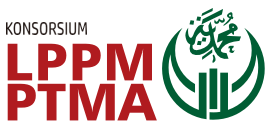Profile of Therapy Adherence-Prolanis Related to Sociodemography: A Literature Review
DOI:
https://doi.org/10.53017/ujhs.75Keywords:
Pharmacy, Medicine, Family Support, KnowledgeAbstract
The results of this literature review present a profile of measuring adherence to therapy in prolanis member. More specifically, the authors explored the adherence related to the sociodemographic variants. The literature search utilizes the Google Scholar data storage base. Researchers used two variants of keywords; (1) “prolanis” and “drug”, (2) “prolanis” and “pharmaceutical”. The literature search is limited to the results of publications during the years 2010-2020. Literature review studies only involve research results that meet the following inclusion criteria; (1) scientific articles published after going through the peer review process, (2) research involving sociodemographic variables and therapy adherence index, (3) research involving only prolanis participants, and (4) research results showing correlation values between variables. A total of 9 articles met the inclusion criteria according to the research objectives. This literature review involved 644 respondents from 12 health centers and 1 treatment center as subjects in this study. The results of our literature review confirm that prolanis participants need family support and adequate knowledge, in order to adhere to therapy. In addition, we also conclude that there is no relationship between gender differences and adherence to therapy. Based on these conclusions, we recommend community pharmacy practitioners, to optimize educational services and provide basic information about drugs, both to prolanis participants and their families. We note that researchers have not mutually agreed on the relationship between therapy adherence with age, education, type of work and home pharmacy care services in prolanis. The exploration of sociodemographic variables, which is still a matter of debate, is a priority for further research to identify adherence to prolanis therapy. We also suggest to future researchers to avoid the use of MMAS-8. The use of questionnaires without permission from the inventor is prone to licensing problems.
Downloads
References
Kemenkes RI, ‘InfoDATIN Diabetes Melitus’. 2020.
L. Azyenela, R. Novelni, and P. Amanda, ‘Hubungan Pengetahuan Terhadap Kepatuhan Minum Obat Pasien Diabetes Mellitus Tipe 2 di Puskesmas Lubuk Buaya’, scientia, vol. 10, no. 1, pp. 56–62, 2020.
Abdiana, ‘Kualitas Hidup Penderita Penyakit Hipertensi Peserta Prolanis Di Puskesmas Kecamatan Padang Utara Kota Padang Tahun 2017’, J. Sehat Mandiri, vol. 14, no. 2, pp. 38–47, 2019, doi: 10.33761/jsm.v14i2.109.
D. Saraswati, Y. N. Fauzi, T. Fitri, and Y. Utami, ‘Peresepan Obat Antihipertensi Dan Antidiabetik Oral Beserta Analisis Ketepatan Pada Pasien Lansia’, J. Ilm. Jophus, vol. 2, no. 01, pp. 44–50, 2020.
K. Badan Penyelenggara Jaminan Sosial, ‘Peraturan Badan Penyelenggara Jaminan Sosial Kesehatan Nomor 7 Tahun 2019’, Peratur. BPJS, vol. 53, no. 9, pp. 1689–1699, 2019.
U. Khasanah, ‘Hubungan Dukungan Keluarga Terhadap Kepatuhan Penatalaksanaan Pengelolaan Diabetes Mellitus Pada Lansia Klub Prolanis di Puskesmas Kecamatan Ciracas Jakarta Timur’, Indones. J. Nurs. Sci. Pract., pp. 70–82, 2019.
Kementerian Kesehatan RI, ‘Hipertensi Penyakit Paling Banyak Diidap Masyarakat’, Kementeri. Kesehat. RI Sekr. R Jenderal Rencana Strateg. Kementeri. Kesehat. Tahun Rencana Strateg. Kementeri. Kesehat. Tahun, p. 248, 2020.
R. Nurhanani, H. S. Susanto, and A. Udiyono, ‘Hubungan Faktor Pengetahuan dengan Tingkat Kepatuhan Minum Obat Antihipertensi (Studi Pada Pasien Hipertensi Essential di Wilayah Kerja Puskesmas Bandarharjo Kota Semarang)’, J. Kesehat. Masy., vol. 53, no. 9, pp. 1689–1699, 2020.
S. B. Santoso, H. Lutfiyati, R. I. Prasidha, S. Ratnafuri, and K. A. Azzahra, ‘What do patients with HIV-infection perceive and know regarding to antiretrovirals? An exploration among participants undergoing controlled-therapy’, Technol. Rep. Kansai Univ., vol. 62, no. 04, p. 7, 2020.
S. B. Santoso, D. A. Perwitasari, I. N. Faridah, and A. A. Kaptein, ‘Hubungan kualitas hidup dan persepsi pasien tentang penyakit diabetes mellitus tipe 2 dengan komplikasi’, Pharmaciana, vol. 7, no. 1, p. 33, May 2017, doi: 10.12928/pharmaciana.v7i1.4699.
Dyah A. Perwitasari, Setiyo B. Santosa, Imaniar N. Faridah, and Adrian A. Kaptein, ‘Illness Perceptions and Quality of Life in Patients with Diabetes Mellitus Type 2’, Indones. J. Clin. Pharm., vol. 6, no. 3, pp. 190–199, Sep. 2017, doi: 10.15416/ijcp.2017.6.3.190.
M. R. Najiha, W. Utaminingrum, M. Ilham, N. Aji, and U. M. Purwokerto, ‘Peran Home Pharmacy Care Pasien Diabetes Mellitus Tipe II Prolanis Terhadap Tingkat Kepatuhan dan Keberhasilan Terapi di BP Sentra Medika Lebaksiu Tegal’, J. Trop. Pharm. Chem., vol. 4, no. 2, pp. 60–65, 2017.
L. Dhar, J. Dantas, and M. Ali, ‘A Systematic Review of Factors Influencing Medication Adherence to Hypertension Treatment in Developing Countries’, Open J. Epidemiol., vol. 07, no. 03, pp. 211–250, 2017, doi: 10.4236/ojepi.2017.73018.
W. Maimaris et al., ‘The Influence of Health Systems on Hypertension Awareness, Treatment, and Control: A Systematic Literature Review’, PLoS Med., vol. 10, no. 7, 2013, doi: 10.1371/journal.pmed.1001490.
R. A. Atinga, L. Yarney, and N. M. Gavu, ‘Factors influencing long-term medication non-adherence among diabetes and hypertensive patients in Ghana: A qualitative investigation’, PLoS ONE, vol. 13, no. 3, pp. 1–15, 2018, doi: 10.1371/journal.pone.0193995.
K. G. Yazew, T. A. Walle, and A. W. Azagew, ‘Prevalence of anti-diabetic medication adherence and determinant factors in Ethiopia: A systemic review and meta-analysis, 2019’, Int. J. Afr. Nurs. Sci., vol. 11, no. June, pp. 0–7, 2019, doi: 10.1016/j.ijans.2019.100167.
Husnah, H. Zufry, and Maisura, ‘Hubungan Pengetahuan Dengan Kepatuhan Pasien Diabetes Melitus Dalam Menjalani Terapi di RSUD dr. Zainoel Abidin Banda Aceh’, J. Kedokt. Syiah Kuala, vol. 6, no. Dm, pp. 62–66, 2014.
R. Wulandari and S. Puspita, ‘Hubungan Pengetahuan, Dukungan Keluarga, dan Peran Petugas Kesehatan Dengan Kepatuhan Penderita Hipertensi Dalam Menjalani Pengobatan’, J. Aisyiyah Med., vol. 4, 2019.
F. Yeni, M. Husna, and Dachriyanus, ‘Dukungan Keluarga Memengaruhi Kepatuhan Pasien Hipertensi’, J. Keperawatan Indones., vol. 19, no. 2, pp. 137–144, 2016.
N. N. Fajriyah, W. A. Ningrum, A. Muthoharoh, and T. Listiana, ‘Hubungan Karakteristik dengan Tingkat Kepatuhan Penggunaan Obat Pada Diabetisi Tipe 2 Prolanis Di Wilayah Kerja Puskesmas Wonopringgo Kabupaten Pekalongan’, Univ. Res. Colloq., vol. 41, no. 9, pp. 2045–2047, 2019.
E. Nazriati, D. Pratiwi, and T. Restuastuti, ‘Pengetahuan pasien diabetes melitus tipe 2 dan hubungannya dengan kepatuhan minum obat di Puskesmas Mandau Kabupaten Bengkalis’, Maj. Kedokt. Andalas, vol. 41, no. 2, p. 59, 2018, doi: 10.25077/mka.v41.i2.p59-68.2018.
G. A. Pramana, R. S. Dianingati, and N. E. Saputri, ‘Faktor-Faktor yang Mempengaruhi Kepatuhan Minum Obat Pasien Hipertensi Peserta Prolanis di Puskesmas Pringapus Kabupaten Semarang’, Indones. J. Pharm. Nat. Prod., vol. 02, pp. 52–58, 2019.
H. Nadia, A. T. Murti, and W. Chairun, ‘Pengaruh Konseling Farmasis Terhadap Kepatuhan Penggunaan Obat Serta Hasil Terapi Pasien Diabetes Melitus’, 5th Urecol Proceding, vol. 5, no. February, pp. 623–630, 2017.
D. Laxmi, S. Kumala, P. Sarnianto, and A. Tarigan, ‘Pengaruh Edukasi Farmasi terhadap Hasil Terapi dan Kualitas Hidup Pasien Prolanis Diabetes Mellitus Tipe 2’, J. Chem. Inf. Model., vol. 6, no. 9, pp. 1689–1699, 2021.
L. M. W. Roslandari, R. K. Illahi, and A. Lawuningtyas, ‘Hubungan antara dukungan keluarga dengan tingkat kepatuhan pengobatan pasien hipertensi rawat jalan pada program pengolahan penyakit kronis’, Pharm. J. Indones., vol. 5, no. 2, pp. 131–139, 2020.
S. Widyastuti, N. M. Yasin, and S. A. Kristina, ‘Pengaruh Home Pharmacy Care Terhadap Pengetahuan, Kepatuhan, Outcome Klinik Dan Kualitas Hidup Pasien Hipertensi’, Maj. Farm., vol. 15, no. 2, p. 105, 2019, doi: 10.22146/farmaseutik.v15i2.47623.
G. Putri, R. Agustina, and F. L. Mustofa, ‘Sosiodemografi dengan Kepatuhan Peserta Prolanis di Puskesmas Kedaton Bandar Lampung’, J. Ilm. Kesehat. Sandi Husada, vol. 12, no. 2, pp. 654–664, 2020, doi: 10.35816/jiskh.v12i2.380.
O. Awwad, A. Akour, S. Al-Muhaissen, and D. Morisky, ‘The Influence of Patients’ Knowledge on Adherence to Their Chronic Medications: a Cross-Sectional Study in Jordan’, Int. J. Clin. Pharm., vol. 37, no. 3, pp. 504–510, 2015, doi: 10.1007/s11096-015-0086-3.
B. Jankowska-Pola?ska, I. Uchmanowicz, K. Dudek, and G. Mazur, ‘Relationship Between Patients’ Knowledge and Medication Adherence Among Patients with Hypertension’, Patient Prefer. Adherence, vol. 10, pp. 2437–2447, 2016, doi: 10.2147/PPA.S117269.
J. P. Tan, K. K. F. Cheng, and R. C. J. Siah, ‘A Systematic Review and Meta-Analysis on the Effectiveness of Education on Medication Adherence for Patients with Hypertension, Hyperlipidaemia and Diabetes’, J. Adv. Nurs., vol. 75, no. 11, pp. 2478–2494, 2019, doi: 10.1111/jan.14025.
F. Saleem et al., ‘Pharmacist Intervention in Improving Hypertension-Related Knowledge, Treatment Medication Adherence and Health-Related Quality of Life: A Non-Clinical Randomized Controlled Trial’, Health Expect., vol. 18, no. 5, pp. 1270–1281, 2013, doi: 10.1111/hex.12101.
H. Lutfiyati, P. Pribadi, and S. B. Santoso, ‘Kesiapan Apoteker dalam Memberikan Layanan Medication Therapy Management’, CERATA J. Ilmu Farm., vol. 10, no. 1, p. 5, 2019.
S. Geisel-Marbaise and H. Stummer, ‘Diabetes Adherence - Does Gender Matter?’, J. Public Health, vol. 18, no. 3, pp. 219–226, 2010, doi: 10.1007/s10389-009-0305-2.
M. T. Gürgöze et al., ‘Impact of sex differences in co-morbidities and medication adherence on outcome in 25 776 heart failure patients’, ESC Heart Fail., vol. 8, no. 1, pp. 63–73, 2021, doi: 10.1002/ehf2.13113.
Q. P. Rasajati, B. B. Raharjo, and D. N. A. Ningrum, ‘Faktor-Faktor Yang Berhubungan Dengan Kepatuhan Pengobatan Pada Penderita Hipertensi di Wilayah Kerja Puskesmas Kedungmundu Kota Semarang’, Unnes J. Public Health, vol. 3, no. 1, pp. 1–10, 2015.
M. K. Yu, C. R. Lyles, L. A. Bent-Shaw, and B. A. Young, ‘Sex Disparities in Diabetes Process of Care Measures and Self-Care in High-Risk Patients’, J. Diabetes Res., vol. 2013, 2013, doi: 10.1155/2013/575814.
T. M. Abegaz, A. Shehab, E. A. Gebreyohannes, A. S. Bhagavathula, and A. A. Elnour, ‘Nonadherence to Antihypertensive Drugs a Systematic Review and Meta-Analysis’, Med. U. S., vol. 96, no. 4, 2017, doi: 10.1097/MD.0000000000005641.
X. Tan, I. Patel, and J. Chang, ‘Review of the four item Morisky Medication Adherence Scale (MMAS-4) and eight item Morisky Medication Adherence Scale (MMAS-8)’, Innov. Pharm., vol. 5, no. 3, pp. 1–8, 2014.
A. Marcus, ‘Pay up or retract? Drug survey spurs conflict’, Science, vol. 357, no. 6356, pp. 1085–1086, Sep. 2017, doi: 10.1126/science.357.6356.1085.
Downloads
Published
How to Cite
Issue
Section
License
Copyright (c) 2021 Dhea Salsa Bella, Setiyo Budi Santoso, Elmiawati Latifah

This work is licensed under a Creative Commons Attribution-NonCommercial 4.0 International License.





